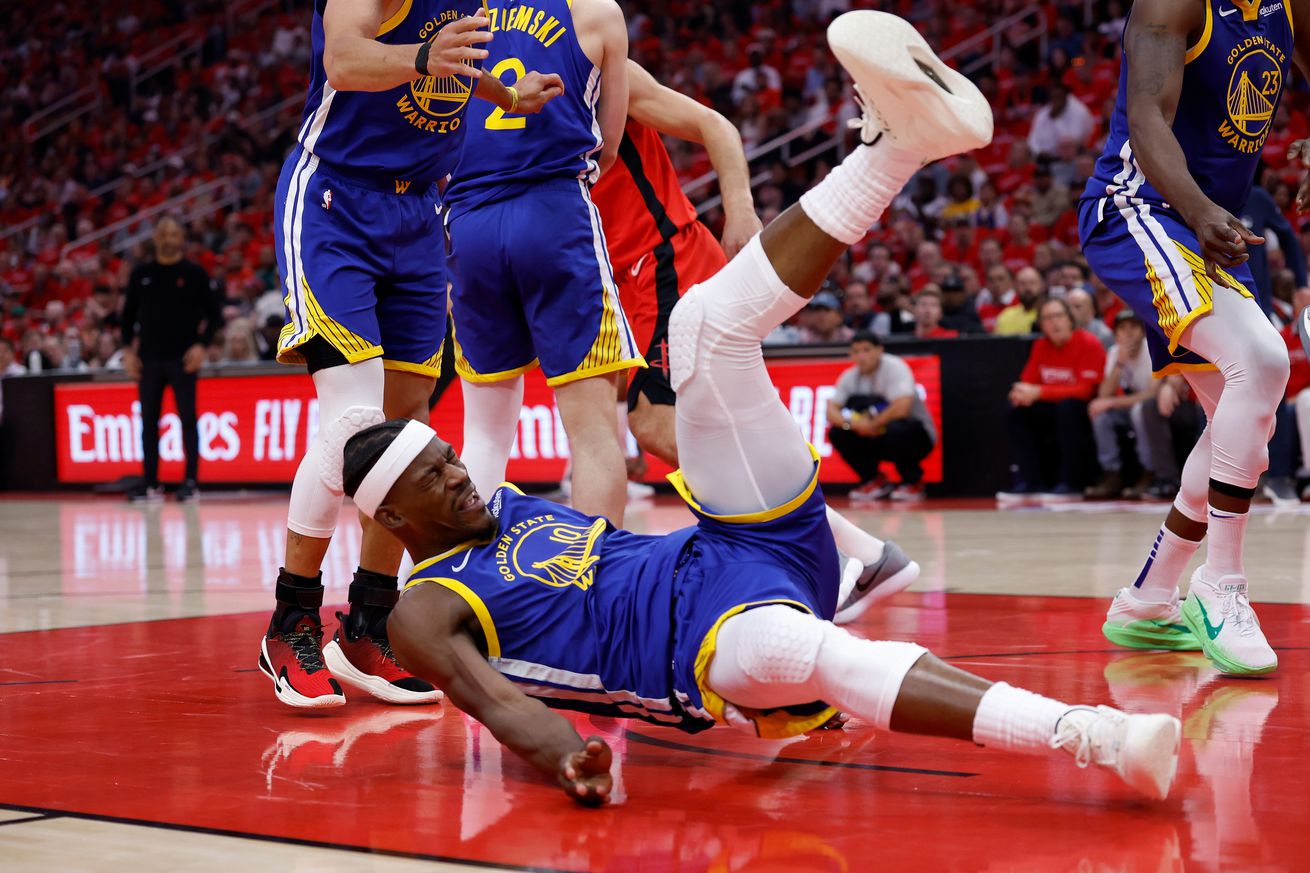
Houston evens the series at 1-all.
Memories often become hazy after a major, potentially series-altering event happens in a playoff game. The rather unfortunate event that happened to Jimmy Butler — bumped by Amen Thompson mid-air, falling on his tush and being unable to return for the rest of the game — may have major consequences for the Golden State Warriors and their chances of winning this series against a young, tough, bruising, *insert other synonyms for physical here*, and audacious Houston Rockets team.
But before that event, the Warriors were facing an eight-point deficit, fueled by fruitless offensive possessions that were countered by the Rockets’ own rejuvenation on offense. To their credit, they were able to weaponize their main offensive tools to a much better degree. Jalen Green, in particular, exploded for 38 points on 69.9% True Shooting after a rather ho-hum playoff debut in Game 1. But the stat that captured my eye: 6 assists.
Jalen’s successful offensive night was as much a product of his own shotmaking as it was making the Warriors’ defense respond to the threat of his scoring — in that regard, it also created opportunities for his teammates. The Rockets were more intentional with picking at pressure points, weak spots they could single out within the Warriors’ defense. For all of the positive reps Quinten Post flashed on offense, it did not escape my notice that the Rockets singled him out once he was deployed on the floor.
Jalen was highly intentional with his attacks against Post, no matter what coverage the Warriors had Post play. In drop situations, Jalen forced Post to defend in space and coaxed out a mandatory late switch, which put the Warriors in rotation and placed them in figurative “blender” situations.
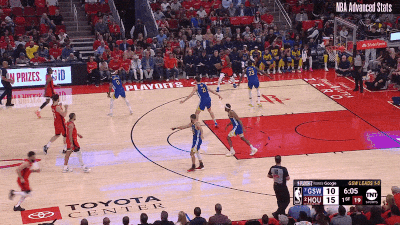
To be fair to Post, he wasn’t the only one whom Jalen and the Rockets had in their sights. Across the board, the containment at the point of attack seemed rather weak, sometimes outright absent. That forced the Warriors’ weak-side defense to respond and help, making them vulnerable to cuts from the baseline and the dunker spot.
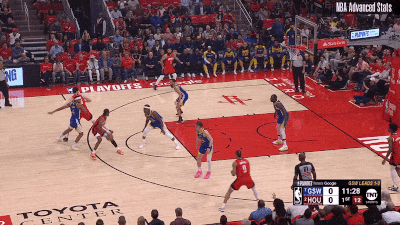
On offense, the effects of Butler’s absence were immediately felt. We musn’t be quick to forget that, prior to Butler’s acquisition, the Warriors were hard pressed to find a consistent stream of offense. Steph Curry had his hands full in that regard, while the Warriors were virtually hapless and inept whenever Curry had to sit on the bench or was outright sidelined. That was a version that had Andrew Wiggins on the team, who — was by no means a viable substitute as an offensive focal point — could at least create shots in flashes, space the floor, and still played a vital role as the primary stopper against opposing perimeter scorers.
This current version without Butler isn’t just a reversion to the Warriors before the trade deadline — it’s arguably a worst version, and one the Rockets were more than happy to pounce on with no mercy.
With Butler and Brandin Podziemski both sidelined, Steve Kerr had no choice but to send Jonathan Kuminga and Pat Spencer — the former to hopefully act as scoring support for Curry, the latter to act as a supplementary ball handler, a role that Podziemski had been occupying before his untimely illness (and one that he tried to fight through, to credit his willingness to tough it out — but a battle he probably should’ve sat out of).
Kuminga was, by and large, remarkable through his unremarkable minutes. He has been a player defined by “flashes.” and while he had flashes tonight, they weren’t enough to replace Butler’s production, let alone impact the Warriors’ chances at winning. Kuminga did try, but his process remained the same as it has for his four seasons in the league — which is and has been a concerning development.
Kuminga’s lack of impactful rim pressure stood out in several ways — one of which was through a possession he technically wasn’t involved in: a Spencer downhill excursion that counted as a missed shot, but engaged the Rockets’ defense enough to allow Kevon Looney to put the ball back in for second-chance points:
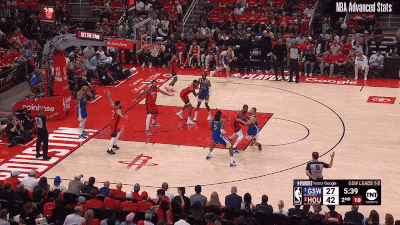
To be quite frank — brutal as it may sound, but a truth that needs to be spoken — intentional, forceful, and effective rim pressure should not be the job of an end-of-the-bench, last-ditch-option player in Spencer; it should be the job of a player drafted seventh in 2021, a square peg that has tried and tried to fit into a round hole (a position that he was pushed into, to be fair to him), and a player blessed with natural talent but hasn’t supplemented that with the skill set to adapt and thrive.
But that is a conversation for another day, and Kuminga is by no means the cause of this loss, nor should he be getting the brunt of the blame; after all, his inclusion wasn’t pre-planned. Rather, the focus should be on how the Warriors respond to adversity — how they adjust against a Rockets defense that has knocked them off kilter, and one that hasn’t been afraid to throw most of their defensive resources toward knocking Curry off kilter. With Butler’s absence and potential absence moving forward, the Rockets will be even more empowered to take Curry away as much as possible and dare everyone else to beat them.
This undertaking may be too daunting of a task for a rookie like Post, but the flashes were there. Despite the warts on defense and his lack of force and physicality, he has the potential to contribute and help lighten Curry’s burden through his ability to punish a defense tilted by Curry’s presence:
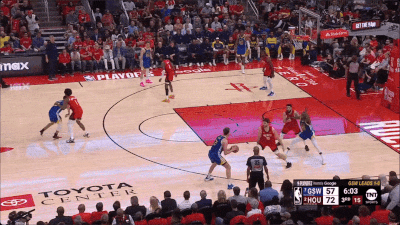
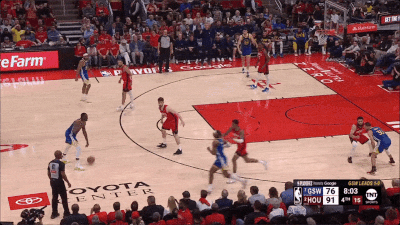
But others also have to step up. Moses Moody seemed rather hesitant and meek. Draymond Green spent more time jawing and arguing than being impactful, which is something Dubs fans will have to endure in exchange for how game changing he can be at a moment’s notice. Buddy Hield just has not been enough of a supplementary spacing threat to provide sufficient relief, nor has he been a shining beacon of defensive chops. Curry could only do so much with a cadre of Rockets’ defenders constantly hounding him and toeing the line between acceptable physicality and outright roughhousing.
The Warriors’ circumstances have suddenly changed for the worse — but those are the cards they’ve been dealt; the onus is on them in terms of how they want to play them.